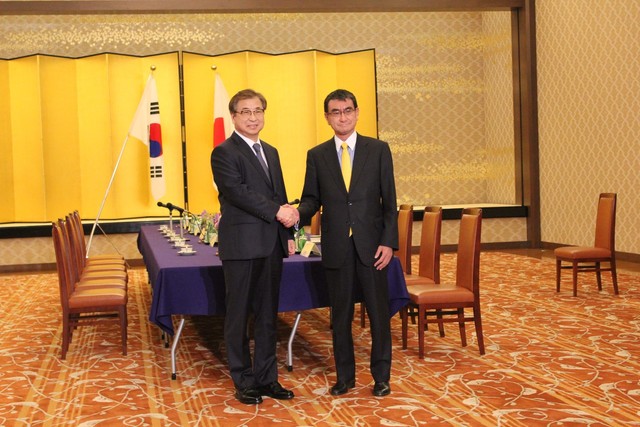 |
|
National Intelligence Service director Suh Hoon shakes hands with Japanese Foreign Minister Taro Kono in Tokyo on Mar. 12. (Photo Pool)
|
Moon administration to focus on soliciting cooperation from leaders of China, Japan, and Russia
Rapid changes in the political situation around the Korean Peninsula, with summits scheduled for South and North Korea in late April and North Korea and the US in May, are turning attention to the roles of China, Japan, and Russia as key interested parties. The Six-Party Talks, in which South and North Korea worked with the US, Japan, China, and Russia toward a resolution of the nuclear issue, have not been held since Dec. 2008. Experts are suggesting Seoul will need to solicit cooperation from Beijing, Tokyo, and Moscow and work to enlist their support in establishing a peace regime on the peninsula. China’s role is seen as essential in establishing a peace regime on the Korean Peninsula, which remains in a state of armistice according to international law. The armistice system has remained firmly in place for over 64 years since the agreement was between the US-led UN Command and the North Korean and Chinese militaries in July 1953. Discussing an official end to the Korean War and establishment of a peace regime alongside denuclearization would require four-party Talks, with China participating as a party to the armistice agreement. Beijing’s cooperation is also essential in broadening the current trilateral dialogue framework among South and North Korea and the US to a four- or six-party approach. China previously served as chair nation for the Six-Party Talks, hosting the first through sixth rounds from Aug. 2003 in Beijing, and played the role of mediator between the US and North Korea. Wi Sung-lac, a former South Korean ambassador to Russia who also served as senior representative to the Six-Party Talks, warned of the “possibility of turbulence in the US-North Korea dialogue process as hardliners in the US make their voices heard.” “As a country that has consistently voiced its support for North Korea-US dialogue, China needs to ensure that the current dialogue gains momentum,” he suggested. The message is that while relations between Pyongyang and Beijing are not as favorable as they were in the past, a role can still be expected from China, which has consistently advocated a freeze-for-freeze approach (suspensions of North Korean nuclear and missile provocations and joint South Korea-US military exercises) and a two-track pursuit of denuclearization of the Korean Peninsula and negotiation toward a peace agreement. Analysts also stressed the importance of support from Japan, which has maintained a hard line in terms of sanctions and pressure on Pyongyang. Many are saying that South Korea should go to work enlisting Japan’s support before the solid US ally joins US hardliners in voicing messages of concern about the “hasty” dialogue with Pyongyang at a US-Japan summit scheduled for April. Possible roles for Japan as denuclearization discussions progress include verifying the North’s adherence to agreements and forming an international consortium to provide economic support to North Korea. “If there are signs of North Korea sanctions being loosened [as a result of North Korea-US dialogue], Japan is going to move to prevent that,” Wi predicted. “The key thing is to gain Japan’s support by proactively sharing details concerning inter-Korean dialogue and trilateral dialogue with the US,” he suggested. Like China, Russia has also called for dialogue and diplomatic solutions on the North Korean nuclear issue and is seen as very likely to support the current dialogue efforts. North Korea and Russia has also been increasingly in communication, with then-North Korean Ministry of Foreign Affairs North American department director Choi Son-hui attending an international nuclear non-proliferation conference in Russia last year. “Russia and Japan may take part in discussions in the medium and long term within the framework of multilateral Northeast Asian security cooperation and energy cooperation,” said Institute for National Security Strategy senior research fellow Cho Sung-ryul. By Noh Ji-won, staff reporter Please direct questions or comments to [english@hani.co.kr]






